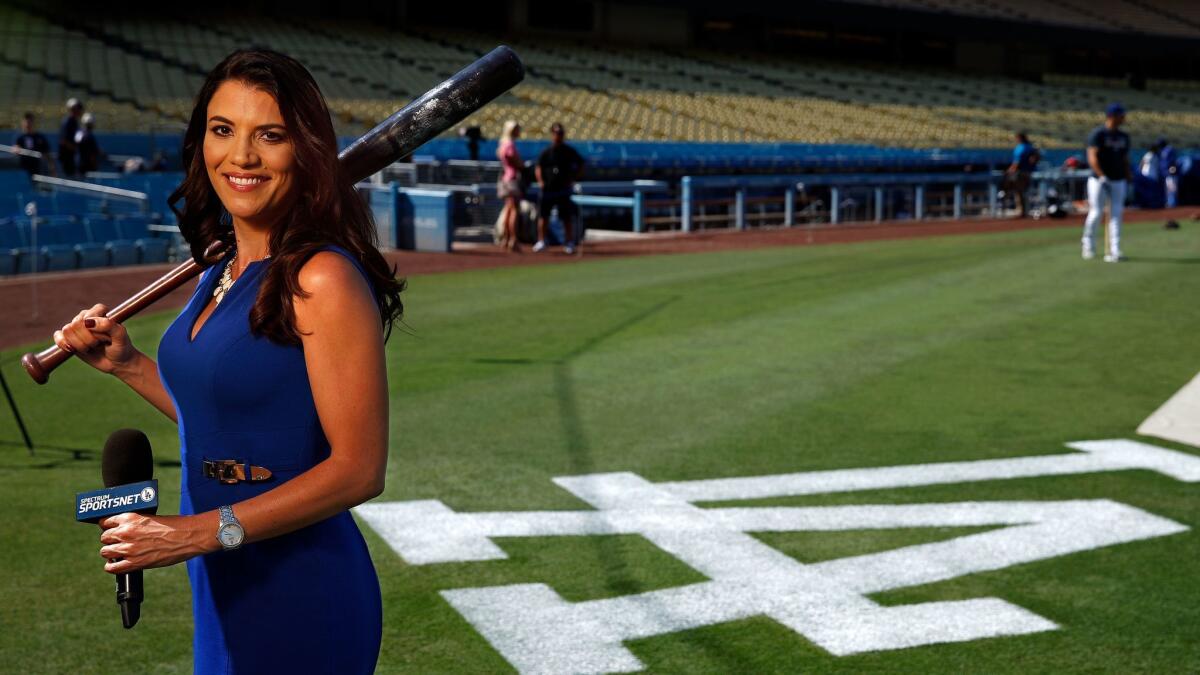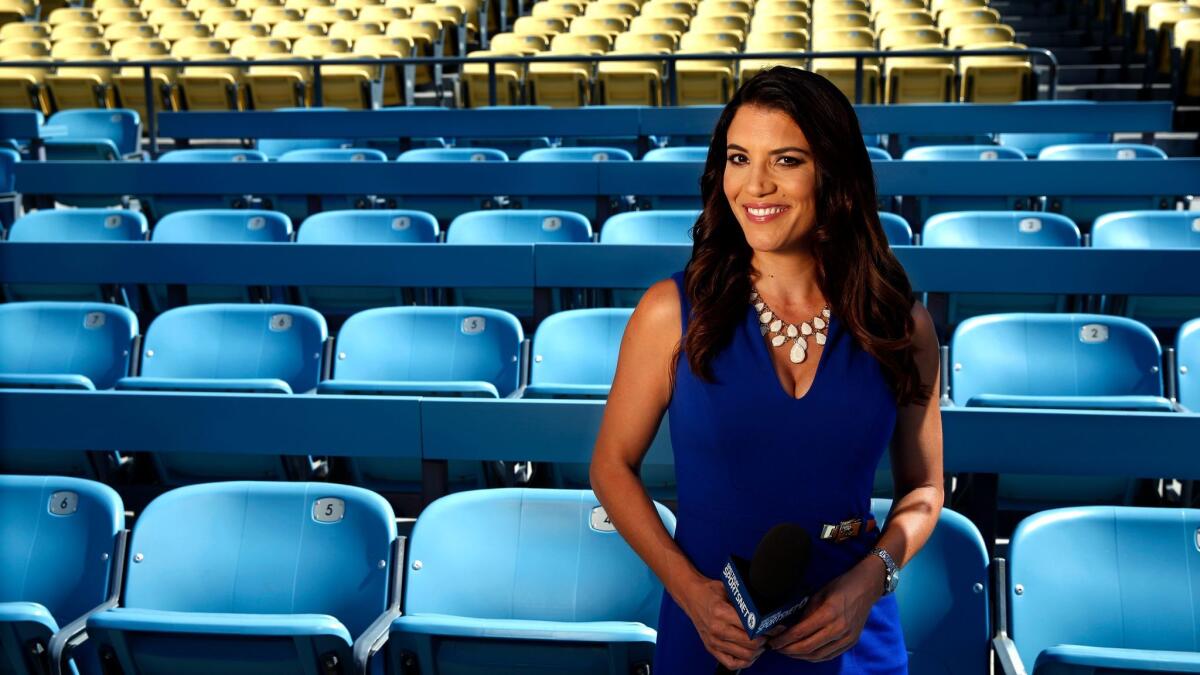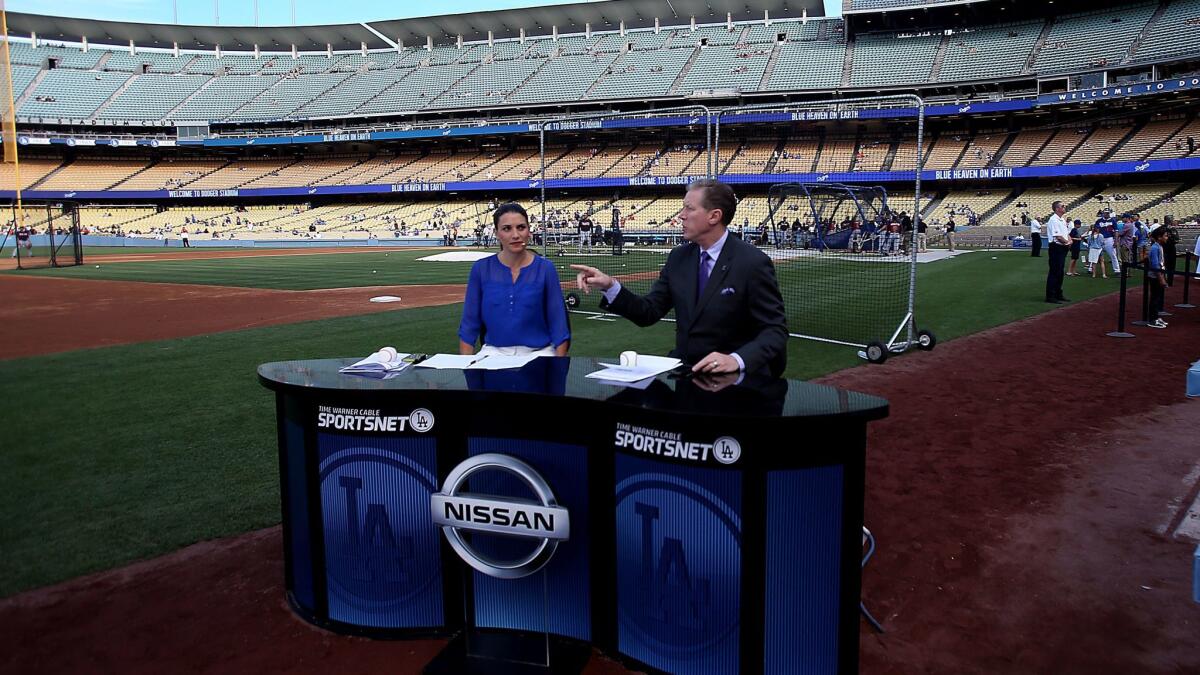Q&A: Dodgers broadcaster Alanna Rizzo is the team’s go-to interviewer. How she earned players’ respect

- Share via
The Dodgers had a record-breaking summer — and an early September to forget — but broadcaster Alanna Rizzo has been there, through thick and thin, to host the team’s pregame show and handle in-game and postgame interviews.
The native Coloradan is in her fourth season with SportsNet LA, and the Dodgers have won the National League West each year. With large of swaths of Southern California not getting the network, Rizzo isn’t the household name and face she might otherwise be, but she’s won over those viewers who can watch by combining the crisp command of a studio host with her ability to pry incisive answers from exuberant rookies and weary veterans alike in the clubhouse and on the field, including in postgame interviews in front of thousands of stadium fans.
Rizzo attended the University of Colorado at Boulder, earning a bachelor’s in international business and a master’s in journalism, then made stops in Wichita Falls, Texas, and Madison, Wis., before heading back to Denver to cover the Rockies and college sports for five seasons. Rizzo joined the Dodgers after a stint with the MLB Network in New Jersey.
If the Dodgers, who host the first game of a National League Division Series on Friday, advance past the first round of the playoffs, Rizzo is on track to cover close to 200 games and conduct 2,000-plus interviews. That includes a grueling regular season schedule of 162 games in 183 days, with many of those “off” days spent traveling.
She’s clearly earned the respect of the players — who good-naturedly tease her — because she does her homework.
What’s your game-day routine?
Often, people think we just show up right before first pitch, and that couldn’t be further from the truth. I’m here four-and-a-half hours before the game starts. My typical routine is to to come to the park, gather all of the interviews for our pregame show as well as do the one-on-one interview, all of the manager’s interviews and then I host an hour show prior.
During the game, I do anywhere from three to five sideline hits. And then postgame, the interview on the field if the Dodgers win, which we’ve had a lot of this year — not lately — but a lot. And then I go immediately to do the Dave Roberts postgame press conference and then go into the clubhouse to gather all of the player interviews for that particular game. It’s that, every single game, throughout the entire season.
Does the road routine differ?
[It] differs in that I’m my own producer on the road. I write all of my own stuff anyway, home or away. All of my own questions; nobody’s feeding me anything.
Who’s your favorite interview?
It’s different guys for different reasons. My favorite player to interview is anyone who will give me an interview. Because when you do so many games, it’s difficult to go to the same guys. But they understand that we have to do a job also. Rich Hill is a very thoughtful interview, really thinks about what he wants to say and has good answers about how he pitched and why he did certain things. Postgame, it’s the player of the game, it’s the story of the game. Sometimes, you’re thinking about the questions you want to ask, and the story lines you want to do, and the game completely changes and you have to switch gears. If it happens to be Yasiel Puig, and he’s had a great year, I do it on the field in Spanish. That’s a challenge.
What teams did you root for growing up?

I’ve been fortunate to witness five no-hitters in person and a lot of people have never seen one.
— Alanna Rizzo, Dodgers broadcaster
I’ve always been a Broncos fan. My dad — my entire family — that’s the only thing we can agree on. And then University of Colorado Buffalo fan all the way. I didn’t grow up a huge baseball fan because I wasn’t exposed to it. We didn’t have Major League Baseball in Denver until 1993.
What got you into broadcasting?
I had an epiphany between Christmas and New Year’s of 2001. I was in sales and marketing in the hotel industry and I was just very unfulfilled. I thought, if I could do anything what would it be? If money wasn’t an object, if I won the lottery or what have you. I’ve always been an avid sports fan and avid participant in my younger years. I took a second mortgage on my house, went back to school and got a master’s in journalism and started from the bottom and worked my way up.
With all the travel, do you have any favorite cities?
Denver, of course, but that’s a biased opinion. I love the big cities. I love New York, I love Chicago. I do actually really like Phoenix. Love San Francisco, but I don’t love the weather. I think Pittsburgh is a very underrated city and it’s one of my favorite ballparks, hands down. PNC Park is beautiful. It’s such a beautiful panoramic view of the city and the bridge, it’s gorgeous.
What do you do to relax?
I always joke that I’m contractually obligated to be perpetually tired because this is such a long season. To get away from it, I love good food and good wine. I’d like to say I work out to get my stress out. I do a little bit but I’m certainly not very disciplined or dedicated. I look forward to the off-season more than anything because you can appreciate the downtime and getting reacquainted with your friends and your family and your life. During the season you just don’t have that opportunity. My passion is dog rescue and dog advocacy. I’m a huge proponent of shutting down puppy mills and rescuing dogs. The whole adopt-don’t-shop campaigns, that’s where my passion lies outside of work.
Do you stay in Southern California in the off-season?
I split time between here and Massachusetts. I do go home to Colorado so it’s a little bit of everywhere. It depends. I’ll go to the winter meetings in Orlando at the beginning of December for all the trades and acquisitions and that type of thing. Other than hosting a show here or there during the off-season, that’s when I recharge and, you know, kind of have some sanity.
What are some favorite moments from your career?

This organization . . . you have legends walking down the hall. I worked with Vin Scully for three years. Don Newcombe is at the park everyday.
I’ve been fortunate to witness five no-hitters in person and a lot of people have never seen one. Clayton [Kershaw]’s dominant performance of 15 strikeouts in his no-hitter against the Rockies was incredible. Every postseason clinching opportunity is special because you never know when they’re going to be able to do it again. A moment from MLB Network that was really special to me was being able to co-host the red carpet show for the All-Star game in New York. All of the amazing people, not just players, that you meet over the years.
Anybody make you nervous?
Certain icons of the game, you’re almost afraid to meet them because you hope they’ll live up to the expectations that you have. This organization in general, you have legends walking down the hall. I think sometimes we take that for granted. To be able to see Tommy Lasorda often, still, at 90 years old. I worked with Vin Scully for three years. Vin Scully knew my name. Don Newcombe is at the park everyday. These are hall of famers and legends of the game and I consider them co-workers. The last interview I did with Sandy Koufax — I call him, respectfully, Mr. Koufax — he’s like, “I’m not doing another interview if you don’t call me Sandy.” Just the people who come through these doors. We’re very fortunate.
What do you tell young women who want to break into the business?
You have to be doubly prepared and work twice as hard as your male counterpart because you already have that stigma that you don’t know what you’re talking about. I think you have to be prepared to move and to sacrifice and not make money and really see if you want to do this. It is not an easy path. It takes a tremendous amount of effort and thick skin.
What's a misconception about you?
People probably think I’m pretty intense. I always look mad and I’m not mad! I just have this natural downturn to my face. I always have a job to do and I’m always on a mission so I may come across like I’m super angry … [Laughs]
See the most-read stories in Entertainment this hour »
ALSO
Baseball and punk rock unite on X night at Dodger Stadium
Dodgers organist pays tribute to Chester Bennington with pregame performance of Linkin Park's 'Numb'
The complete guide to home viewing
Get Screen Gab for everything about the TV shows and streaming movies everyone’s talking about.
You may occasionally receive promotional content from the Los Angeles Times.




